Related Research Articles

Susan Lee Lindquist, ForMemRS was an American professor of biology at MIT specializing in molecular biology, particularly the protein folding problem within a family of molecules known as heat-shock proteins, and prions. Lindquist was a member and former director of the Whitehead Institute and was awarded the National Medal of Science in 2010.

David Baltimore is an American biologist, university administrator, and 1975 Nobel laureate in Physiology or Medicine. He is President Emeritus and Distinguished Professor of Biology at the California Institute of Technology (Caltech), where he served as president from 1997 to 2006. He also served as the director of the Joint Center for Translational Medicine, which joined Caltech and UCLA in a program to translate basic scientific discoveries into clinical realities. He also formerly served as president of Rockefeller University from 1990 to 1991, founder and director of the Whitehead Institute of Biomedical Research from 1982 to 1990, and was president of the American Association for the Advancement of Science in 2007.
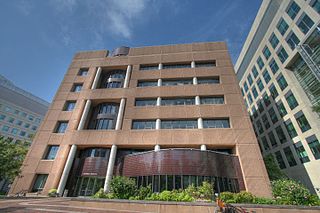
Whitehead Institute for Biomedical Research is a non-profit research institute located in Cambridge, Massachusetts, United States that is dedicated to improving human health through basic biomedical research. It was founded as a fiscally independent entity from the Massachusetts Institute of Technology (MIT), where its 18 members all hold faculty appointments in the MIT Department of Biology or the MIT Department of Bioengineering. Two members are National Medal of Science recipients; ten have been elected to the National Academy of Sciences; and four have been elected to the National Academy of Medicine; six are Howard Hughes Medical Institute Investigators.

The Eli and Edythe L. Broad Institute of MIT and Harvard, often referred to as the Broad Institute, is a biomedical and genomic research center located in Cambridge, Massachusetts, United States. The institute is independently governed and supported as a 501(c)(3) nonprofit research organization under the name Broad Institute Inc., and it partners with the Massachusetts Institute of Technology, Harvard University, and the five Harvard teaching hospitals.
Robert Allan Weinberg is a biologist, Daniel K. Ludwig Professor for Cancer Research at Massachusetts Institute of Technology (MIT), director of the Ludwig Center of the MIT, and American Cancer Society Research Professor. His research is in the area of oncogenes and the genetic basis of human cancer.
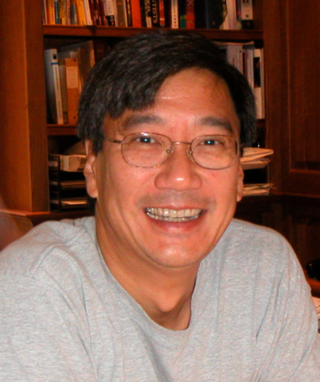
Peter S. Kim is an American scientist. He was president of Merck Research Laboratories (MRL) 2003–2013 and is currently Virginia & D.K. Ludwig Professor of Biochemistry at Stanford University, Institute Scholar at Stanford ChEM-H, and Lead Investigator of the Infectious Disease Initiative at the Chan Zuckerberg Biohub.

Angelika Amon was an Austrian American molecular and cell biologist, and the Kathleen and Curtis Marble Professor in Cancer Research at the Massachusetts Institute of Technology (MIT) in Cambridge, Massachusetts, United States. Amon's research centered on how chromosomes are regulated, duplicated, and partitioned in the cell cycle. Amon was elected to the American Academy of Arts and Sciences in 2017.
Yukiko Yamashita is an American developmental biologist. She joined the Whitehead Institute in September 2020 and has been appointed a Professor of Biology at Massachusetts Institute of Technology (MIT). She is the inaugural incumbent of the Susan Lindquist Chair for Women in Science at Whitehead Institute. She was previously a faculty member of the University of Michigan Life Sciences Institute and a professor in the Department of Cell and Developmental Biology at the University of Michigan Medical School. She was appointed an HHMI Investigator in 2013. In November 2013 she received a 5-year appointment as the James Playfair McMurrich Collegiate Professor of the Life Sciences at the University of Michigan Medical School. Her current research at the Whitehead Institute and MIT focuses on germline immortality is maintained by germline stem cell behavior.
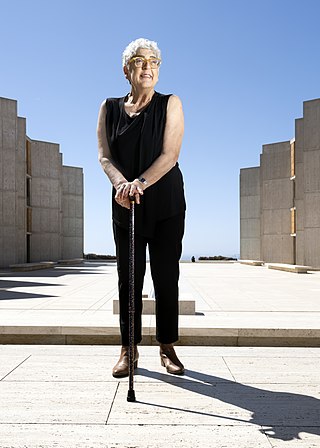
Joanne Chory is an American plant biologist and geneticist. Chory is a professor and director of the Plant Molecular and Cellular Biology Laboratory, at the Salk Institute for Biological Studies and an investigator of the Howard Hughes Medical Institute.

Lydia Villa-Komaroff is a molecular and cellular biologist who has been an academic laboratory scientist, a university administrator, and a business woman. She was the third Mexican-American woman in the United States to receive a doctorate degree in the sciences (1975) and is a co-founding member of The Society for the Advancement of Chicanos/Hispanics and Native Americans in Science (SACNAS). Her most notable discovery was in 1978 during her post-doctoral research, when she was part of a team that discovered how bacterial cells could be used to generate insulin.
Radhika Nagpal is an American computer scientist and researcher in the fields of self-organising computer systems, biologically-inspired robotics, and biological multi-agent systems. She is the Fred Kavli Professor of Computer Science at Harvard University and the Harvard School of Engineering and Applied Sciences. She is also a Core Faculty Member of the Harvard Wyss Institute for Biologically Inspired Engineering. In 2017, Nagpal co-founded a robotics company under the name of Root Robotics. This educational company works to create many different opportunities for those unable to code to learn how.
Ruth Lehmann is a developmental and cell biologist. She is the Director of the Whitehead Institute for Biomedical Research, succeeding David Page. She previously was affiliated with the New York University School of Medicine, where she was the Director of the Skirball Institute of Biomolecular Medicine, the Laura and Isaac Perlmutter Professor of Cell Biology, and the Chair of the Department of Cell Biology. Her research focuses on germ cells and embryogenesis.
Terry L. Orr-Weaver is an American molecular biologist in the MIT Department of Biology with a joint appointment to the Whitehead Institute. She does research on developmental biology, with a focus on "[c]oordination of cell growth and division with development, with particular focus on the oocyte-to-embryo transition, control of cell size, and regulation of metazoan DNA replication." Orr-Weaver and her collaborators have identified two proteins necessary for the proper sorting of chromosomes during meiosis with implications for cancer and birth defects. In 2006 she was elected to the National Academy of Sciences.
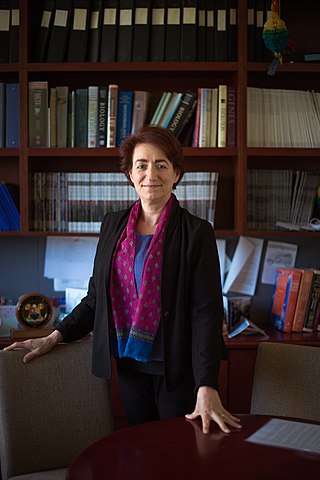
Hazel L. Sive is a South African-born biologist and educator. She is Dean of the College of Science, and Professor of Biology at Northeastern University. Sive is a research pioneer, award-winning educator and innovator in the higher education space who was elected as a Fellow of the American Association for the Advancement of Science in November 2021. Prior to June 2020, she was a Member of Whitehead Institute for Biomedical Research, Professor of Biology at Massachusetts Institute of Technology and Associate Member of the Broad Institute of MIT and Harvard. Sive studies development of the vertebrate embryo, and has made unique contributions to understanding how the face forms and how the brain develops its structure. Her lab also seeks to understand the origins of neurological and neurodevelopmental disorders, such as epilepsy, autism, Pitt–Hopkins syndrome and 16p11.2 deletion syndrome.

Anne E. Carpenter is an American scientist in the field of image analysis for cell biology and artificial intelligence for drug discovery. She is the co-creator of CellProfiler, open-source software for high-throughput biological image analysis, and a co-inventor of the Cell Painting assay, a method for image-based profiling. She is an Institute Scientist and Senior Director of the Imaging Platform at the Broad Institute.

Elizabeth Anna Ainsworth is an American plant physiologist currently employed by the United States Department of Agriculture (USDA) Agricultural Research Service (ARS). She also is an Adjunct Professor of the University of Illinois at Urbana-Champaign (UIUC), a Fellow of the American Association for the Advancement of Science (AAAS) and was awarded the 2018 Crop Science Society of America Presidential Award. She is known for her work concerning the effects of specific atmospheric pollutants, including ozone and carbon dioxide, on the productivity of selected major crops such as corn and soybeans.
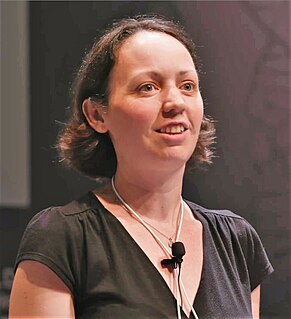
Celeste M. Nelson is a Professor of Chemical and Biological Engineering and the Director of the Program in Engineering Biology at Princeton University. She is a Fellow of the American Institute for Medical and Biological Engineering (AIMBE) and was a finalist in the 2017 and 2018 Blavatnik Awards for Young Scientists.
Jennifer Lyn Nemhauser is an American biologist and a Professor of Developmental Biology at the University of Washington in Seattle, Washington. She specializes in synthetic biology, genomics, and signaling dynamics in plants.
Samira Musah is an American biomedical engineer and professor at the Duke University Pratt School of Engineering. She is known for her work in biomimetic systems, in particular for her work in developing an organ-on-a-chip model of the kidney glomerulus during her postdoctoral fellowship.
Maribel Rios is a neuroscientist originally from San Juan, Puerto Rico. She received a Bachelor of Arts in neuroscience from Boston University, followed by a Doctor of Philosophy in Cell, Molecular, and Developmental Biology from the Sackler School at Tufts University. Rios continued her studies by attending the Whitehead Institute at the Massachusetts Institute of Technology, where she completed her post-doctoral training in genetics. Following her education, she returned to Tufts where she serves as a professor of neuroscience.
References
- ↑ "Gehring Lab - Research". gehringlab.wi.mit.edu. Retrieved 2017-11-26.
- ↑ "Mary Gehring | MIT Biology". biology.mit.edu. Retrieved 2017-12-22.
- ↑ "Whitehead Institute - Faculty - Mary Gehring". wi.mit.edu. Retrieved 2017-11-26.
- 1 2 "Mary Gehring: Cell Press". www.cell.com. Retrieved 2017-11-26.
- ↑ Gewin, Virginia (2010-11-24). "Turning point: Mary Gehring". Nature. 468 (7323): 591. doi: 10.1038/nj7323-591a .